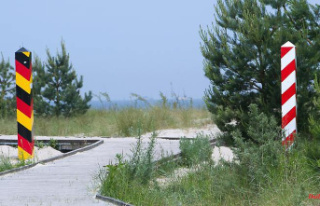Turkey has paved the way for Sweden and Finland to join NATO. "I hope for a very short accession phase," said Swedish Defense Minister Peter Hultqvist in an interview with ntv.de from Madrid. He is satisfied with the security assurances from Washington and reiterates: Sweden is expected to increase its defense spending to 2 percent of GDP by 2028.
ntv.de: With the accession of Sweden and Finland, NATO will be able to realign its armed forces structure in the Baltic Sea region. Is that enough for a credible deterrent?
Peter Hultqvist: Russia is unpredictable; it is very important to recognize that given his actions in Ukraine. It wants to exert direct influence on neighboring countries and on their right to make their own security decisions. It is willing to use military power to achieve its political goals. We have to think realistically. It is very important to raise the threshold to armed conflict through military capabilities to defend against Russia's actions. We must be united in Scandinavia, in a democratic Europe. Russia should know this: if it does something evil, it will have to pay a very high price.
What could help raise the threshold?
Different weapon systems, coordinated military planning between the countries in Scandinavia, with the Baltic States, with the USA and NATO. We have expanded our defense agreements with other countries, improved our interoperability and conducted military exercises with neighboring countries. But in this new security environment, we had to go one step further and apply for NATO membership.
In May you met Secretary of Defense Lloyd Austin at the Pentagon. Are you satisfied with the security commitments from Washington for the accession phase?
We see the US, UK and other countries delivering on their security promises. We are talking about the US naval presence in the Baltic Sea region, US Air Forces and US troops conducting joint exercises with our forces and operating in our neighborhood. We have excellent cooperation with Great Britain, United States and countries around the Baltic Sea. But we have to prove through military maneuvers, through various deployments of our defense forces, that we too are active.
Russia's ex-president and current deputy head of the Russian Security Council, Dmitry Medvedev, has threatened Finland and Sweden with rearmament and nuclear weapons "on their doorstep" if they join NATO.
We cannot allow Russia to decide what Sweden or Finland should do. Russia is waging a very aggressive war in Ukraine. This has now led to Sweden and Finland applying for NATO membership in order to have more security in our part of Europe in the long term. There is no dialogue between countries that have nuclear weapons systems. And I believe that there won't be such a dialogue for a long time. In our view, Russian nuclear weapons systems are a threat to our part of Europe because Russia says it wants to use them. But I hope there is enough wisdom that they are not used.
What increase in military spending and defense capabilities can Sweden expect in the medium term?
Our goal is to increase the armed forces from 60,000 to 100,000 soldiers. I think this number could be even higher in the future. As announced by the government and the Commander-in-Chief of the Armed Forces, General Micael Bydén, we will increase our defense spending to 2 percent of gross domestic product (GDP). I think it is realistic that this will happen by 2028.
At this summit in Madrid, NATO is revising its strategic concept. What contribution should Sweden make to this new premise?
When we join NATO, and I think we will, the first thing we have to do is start military planning in Scandinavia. As part of this process, we will also discuss the future role of Sweden and Finland.
What challenges do you expect in the accession phase?
I hope that the accession period will be very short and that we can become a member of NATO very quickly. We take it seriously when NATO says it has an open-door policy.
How long can we talk about here?
It will happen when it happens.
Ekaterina Venkina spoke with Peter Hultqvist












